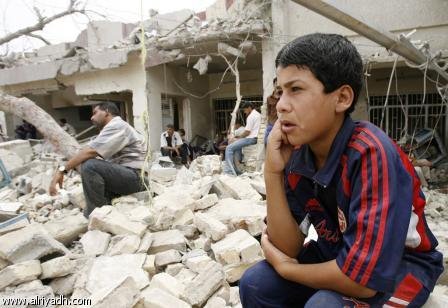لندن 16 يناير كانون الثاني -رويترز -
افاد تقرير اليوم الأربعاء أن قطاع الرعاية الصحية في العراق في حالة فوضى نظرا لفرار الأطباء والعاملين بالتمريض الى الخارج وارتفاع معدل وفيات الأطفال. وقال التقرير الذي أعدته منظمة ميداكت إن نحو 75 بالمئة من الأطباء والصيادلة والعاملين بالتمريض العراقيين تركوا وظائفهم منذ الغزو الذي قادته الولايات المتحدة على البلاد عام 2003. وهاجر أكثر من نصف الفارين. وأضاف التقرير الذي يحمل عنوان (إعادة التأهيل تحت النيران) القطاع الصحي في حالة فوضى ليس فقط بسبب الوضع الأمني السائد ولكن أيضا بسبب الافتقار لإطار عمل مؤسسي ونقص كبير في العاملين وانقطاع الكهرباء ونقص امدادات المياه النقية والانتهاكات المتكررة للحياد الطبي. وليس في العراق حاليا سوى تسعة آلاف طبيب أي بمعدل ستة أطباء لكل عشرة آلاف شخص بالمقارنة مع 23 طبيبا لكل عشرة آلاف في بريطانيا. وقالت ميداكت الفشل المتكرر في ادراك الوضع الخاص للخدمات الصحية والعاملين في أوقات الصراع اوجد مناخا سادت فيه انتهاكات معاهدة جنيف.
وأضافت المنظمة ان ذلك اثار انتقادات خاصة بوزارة الدفاع الأمريكية التي ادارت شؤون العراق بعد الغزو مباشرة. فقد انتهجت الوزارة برنامجها الخاص بها المتعلق بإعادة بناء القطاع الصحي متجاهلة الممارسات الدولية. ومن بين أكثر من 18 مليار دولار خصصت لإعادة إعمار العراق تم توجيه اربعة في المئة منها فقط للرعاية الصحية. وفي حين ارتفع نصيب الفرد من الانفاق على الرعاية الصحية من 23 دولارا في 2003 إلى 58 دولارا في 2004 قالت ميداكت إن البيروقراطية والافتقار للكفاءة أدى إلى ان جزءا من ميزانية الرعاية الصحية لم ينفق بعد. وقال التقرير منحت العقود الكبيرة لإعادة إعمار القطاع الصحي بتسرع شديد وبقليل من المشاورات. وتابع التقرير النتائج السريعة وتحقيق انجازات ملموسة مثل المباني وإن كانت جذابة سياسيا إلا انها امتصت موارد مهمة دون كفاءة ولم تنجح في ارساء أسس بعيدة المدى. ونتيجة لرغبة الولايات المتحدة في تنفيذ برنامج الخصخصة اتخذ قرار كذلك بإعادة كتابة نشرة الادوية التي توردها وزارة الصحة العراقية. وقالت ميداكت إن هذه كانت عملية مكلفة وتفتقر للكفاءة لم توفر شيئا للمرضى. وتابع التقرير أن معدل وفيات الأطفال دون سن الخامسة يقترب الآن من مستواه في دول جنوب الصحراء في افريقيا على الرغم من ان العراق دولة غنية نسبيا وتتمتع بموارد ومستوى مرتفع من التعليم. وقال التقرير إن ثمانية ملايين عراقي يحتاجون إلى مساعدات طبية عاجلة. وتابعت المنظمة أن العراقيين -سواء الزعماء السياسيين او الخبراء في مجال الصحة والمجتمع- يجب ان يكون لهم صوت أكبر في تطوير القطاع الصحي. وطالبت المنظمة كذلك بتجدد الاهتمام بالصحة العقلية وهو مجال طبي كان يحظى دائما باهتمام محدود في العراق. وقالت هناك مشكلات كبيرة تتعلق بالصحة العقلية... فكثيرون لا يجدون رعاية تذكر في مجال الصحة العقلية ويوصم بالعار المصابون ببعض الاختلالات العقلية
Published by Medact, 16th Jan 2008
Executive Summary
This report describes how the 2003 war and its aftermath continue to have a disastrous impact on the physical and mental health of the Iraqi people. It builds on Medact’s previous widely-read reports on Iraq (2002-2006). Reviewing developments in Iraq in the light of international humanitarian law and best practice, it highlights the failure of the occupying forces and their governments either to protect health, or to facilitate the rebuilding of a health system based on primary health care principles.
Urgent measures are needed to improve health and health services.Assessing the Iraqi health system, the report considers five major aspects: policy, human resources, infrastructure, supplies, and health information. It scrutinizes one specific area of health need - mental health, often neglected despite its profound long-term impact.Collecting accurate health information is extremely difficult in such an insecure and politicized environment.
However, there are undoubtedly very high levels of conflict-related mortality and morbidity, and an acute need for emergency aid. Iraq’s constitution recognizes the duty of the state to respond to those needs but the obstacles are formidable:The health system is in disarray, not only because of the underlying security, but owing to the lack of an institutional framework, huge staff shortages, intermittent electricity, unsafe water supply, and frequent violations of medical neutrality.
The Ministry of Health and local health authorities are mostly unable to meet these huge challenges, while the activities of UN agencies and nongovernmental organizations are restricted. Repeated failures to recognize the special status of health services and personnel in times of conflict have created an environment in which violations of the Geneva Conventions are common.
Total health expenditure rose from US $23 per capita in 2003 to $58 in 2004, nearly half from out-of-pocket payments. Yet bureaucracy and import problems prevented the Ministry of Health from spending all its budget in 2006-7. The unregulated health economy, the professionals' need to maximize their income, and the individualistic, specialty-focused traditions of Iraqi medicine are creating a fragmented fee-for-service system that delivers often inadequate curative care, and neglects preventive health care.Occupying powers operating through a newly appointed government have responsibilities under the Geneva Conventions but these have routinely been ignored.
Health facilities were not protected during or after the invasion, and looting and violence undermined health services. The occupying powers mostly stood back and politicians attempted to give the looting a positive spin.Expertise from UN organizations, within the US and UK governments, and from Iraqi professionals, was often sidelined after the invasion. The US Defence Department pursued its own agenda and ignored international best practice in relief and development.
The Coalition Provisional Authority allocated only 4% of the US $18.4 billion Iraqi Relief and Reconstruction Fund to health, knowing it was inadequate.Iraqis had little opportunity to influence the future of their health services. The sacking of Ba'ath party members from senior posts removed important health expertise, and apart from a few projects there was little or no inclusive policy-making or inclusion of community and religious groups and leaders.
Successive Iraqi ministers of health indicated commitment to rebuilding a primary care-led system free at the point of delivery, but had little power to influence de facto privatization.
Despite promising initial planning and pay rises there is no overall strategic plan on human resources for health. Up to 75% of doctors, pharmacists and nurses have left their jobs since 2003, and over half of these have fled abroad.
Training institutions struggle to stay open, students face threats, and there is little career development. The roles of nurses and midwives are particularly poorly developed. Despite their dedication, many of the health workers who remain have reached breaking point - struggling against enormous odds to keep services going.
Large health sector reconstruction contracts were awarded with great haste and little consultation.
Rapid results and highly visible ‘deliverables’ such as new buildings, while politically attractive, absorbed important resources inefficiently and failed to lay long-term foundations.Effective procurement and distribution of medicines was undermined by the US drive for privatization.
The national formulary (list of drugs supplied by the Ministry of Health) was initially adjusted without local consultation or WHO expertise. Drugs are often in short supply or out of stock. The prescription medicines that patients buy in their local market are often counterfeit, adulterated or date-expired – and expensive.There are significant mental health problems. There are some new hospital-based mental health facilities, but no children’s or community-based services.
Many people receive little or no mental health care, and stigma is associated with severe mental disorders.The report makes a number of recommendations, including:Iraqi leaders, health experts and civil society should be given the space to determine the development of their health system on the basis of their constitution.WHO should be given greater internal and external support to facilitate this process.The abuses of international law in Iraq need to be objectively documented, and there must be greater accountability.
More support for humanitarian projects is needed. Small-scale local programmes which could meet some health needs are inadequately funded.More support is needed for a mental health strategy based on WHO principles.Medact is an organization of health professionals that highlights and takes action on the health consequences of war, poverty and environmental degradation and other major threats to global health.





